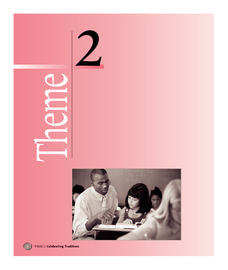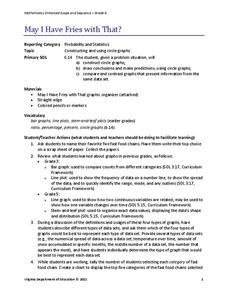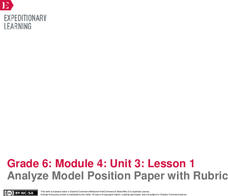Jamestown-Yorktown Foundation
Making a Patriot Inquiry: Are Independence, Freedom, and Liberty the Same Thing?
As part of a study of the American Revolution, class members engage in an inquiry-based lesson that has them watch a scene from the play Slave Spy, examine multiple primary source documents, and then discuss the similarities and...
Curated OER
Nonfiction Genre Mini-Unit: Persuasive Writing
Should primary graders have their own computers? Should animals be kept in captivity? Young writers learn how to develop and support a claim in this short unit on persuasive writing.
Jamestown-Yorktown Foundation
Why Did Some Colonial Virginians Continue to Support the King?
Not all colonials supported the American Revolution. A resource from the American Revolution Museum at Yorktown ask young historians to investigate the reasons why some colonial Virginians were loyalist and continued to support King...
Novelinks
Where the Red Fern Grows: Question Answer Response Strategy
What makes a good question? Middle schoolers explore the use of questioning through QAR, the question answer response strategy, while reading Where the Red Fern Grows. They learn about the four types of questions: right there, think and...
Carfleo
Substance Use and Abuse
What is substance abuse? What is the difference between a depressant and a stimulant? Here is a comprehensive unit on drug use, including three lessons with such activities as categorizing and defining key terms, identifying issues...
Virginia Polytechnic Institute and State University
Lesson Plan: Successful Microwave Cooking
No need to be involved in a home economics or cooking courses to take advantage of this resource. Not only is there an explanation for how microwaves work but there are also tips for how to use the microwave, and cautions for what not to...
Houghton Mifflin Harcourt
Animal Adventures: Challenge Activities (Theme 6)
Challenge learners who have mastered the basic concepts in the Houghton Mifflin Harcourt thematic units on animal adventures with the activities and exercises suggested in this packet packed with ideas.
Houghton Mifflin Harcourt
Celebrating Traditions: Challenge Activities (Theme 2)
Here's a packet of activities, designed to be used with the Houghton Mifflin Harcourt textbook, that will engage and challenge learners who have already mastered the basic skills in a thematic unit study of traditions.
CPALMS
Point of View: A Close Reading of Two Bad Ants
Chris Van Allsburg's Two Bad Ants provides third graders with an opportunity to examine point of view and how the point of view of others may differ from their own.
Houghton Mifflin Harcourt
Surprise!: Challenge Activities (Theme 2)
Surprise! is the theme of this series of challenge activities. The surprise comes from the information your scholars will discover when researching topics such as alligators and crocodiles, living in other countries, becoming a...
Youth Leadership Initiative
Selecting a President: Primaries and Caucuses
What is a party caucus anyway? And what part do caucuses play in the primaries? Everything future voters need to know about the four stages in the presidential selection process is provided by this resource. The 2012 US Presidential...
Curated OER
Parts of a Friendly Letter
The art of writing a letter has not been lost to email and texting! Teach kids how to format a friendly letter with a presentation about the parts of a letter, as well as prompting them to write a letter about their favorite holiday.
Curated OER
Mini-Lesson Planning for Inferences
Making inferences and drawing conclusions is a key component to successful active reading. Encourage your class to use context clues and prior knowledge to infer different elements of a story, including the setting, plot, and character...
Maryland Department of Education
The Concept of Diversity in World Literature Lesson 9: Debating Imperialism
To gain an understanding of Imperialism, class members read Rudyard Kipling's poem, "The White Man's Burden" and Mark Twain's essay, "To the Person Sitting in Darkness." Groups compare these perceptions of non-white cultures with the...
Curated OER
Hero or Tyrant: Connecting Beethoven’s Third Symphony to Napoleon, Part One
The second and third movements of the Eroica, Beethoven's Symphony No. 3, provides listeners with an opportunity to connect to French Revolution and to Napoleon Bonaparte. As they listen to the music, individuals draw what their ears...
Do2Learn
Tone of Voice and Volume Control
What level of voice is most appropriate for the classroom? Develop volume control in your learners with ASD with an activity that lets them know when they are using appropriate and inappropriate voice level.
Virginia Department of Education
Out of the Box
There's no need to think outside the box for this one! Scholars measure the length, width, and height of various boxes. Results help develop the formulas for the surface area and volume of rectangular prisms.
Virginia Department of Education
May I Have Fries with That?
Not all pie graphs are about pies. The class conducts a survey on favorite fast food categories in a lesson on data representation. Pupils use the results to create a circle graph.
Missouri Department of Elementary
Conflict Mediation – Part 1: Getting Ready
Two scholars walk into a room arguing, what is happening? Peers observe the two actors in preparation for a whole-class discussion about conflict. Learners establish a conflict, name the three approaches—passive, aggressive, and...
University of Oklahoma
Improving My Communication Skills
The two lessons in the fifth unit in this series are designed to help students with disabilities improve their communication skills. The first lesson has class members practice strategies and skills for appropriate communication. They...
EngageNY
Making a Claim: Moon Shadow’s Point of View of the Immediate Aftermath
Body paragraphs are the building blocks of every essay. Pupils view and discuss a model essay using a rubric to evaluate one of its supporting paragraphs. Next, scholars use what they've learned to continue drafting their own literary...
EngageNY
Analyze Model Position Paper with Rubric
It's time to choose a position! Scholars read a model position paper about fracking to practice identifying the topic and argument. Then, working with a partner, they use a rubric to assess the essay.
EngageNY
Forming a Research-Based Claim: Cascading Consequences Chart
Can you put that in writing? Scholars work with a partner to write a practice claim before writing their own claims. After writing their claims, learners share with class using a Concentric Circles activity.
EngageNY
Applying Research Skills: “Rachel Carson: Environmentalist and Writer”
It's important to cite sources! Scholars take a closer look at their research about DDT by examining how to cite sources. Learners take turns sharing information that would be used to cite sources to complement Rachel Carson:...
Other popular searches
- Biography Graphic Organizer
- Main Idea Graphic Organizers
- Vocabulary Graphic Organizer
- Story Map Graphic Organizer
- Science Graphic Organizers
- Setting Graphic Organizer
- Math Graphic Organizers
- 4 Square Graphic Organizer
- Sample Graphic Organizers
- Comic Book Graphic Organizer
- Graphic Organizer Legend
- Writing Graphic Organizers

























